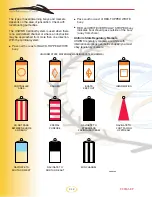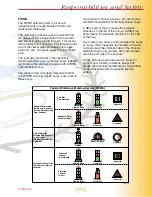
2-4
Seaworthiness Inspection
The following checks are essential to safe boating
and must be performed before starting the
engines. Get into the habit of performing these
checks in the same order each time so that it
becomes routine.
●
Check the weather report, wind and water
conditions.
●
Check that required safety equipment is
onboard.
●
Check that fire extinguisher(s) is fully charged.
●
Check that bilge drain plug is properly installed.
●
Check that no fuel, oil or water is leaking or has
leaked into the bilge compartment.
●
Check all hoses and connections for leakage
and damage.
●
Check that all batteries are fully charged and
have the proper level.
●
Check electrical circuits (lights, pumps, horn,
etc.) for proper operation.
●
Check that steering system operates properly.
●
Be sure the boat is not overloaded.
●
Check that all maintenance has been
performed.
Operation Checklist
While operating your boat, frequently check that
the control and steering system continue to
operate smoothly. Monitor your gauges for signs
of abnormal behavior. Beware of any excessive
vibration. Refer to
Before Starting Checklist
, in
Section 3
.
!
WARNING
Do not operate the boat if any problem is
found during this inspection. A problem
could lead to an accident during the
outing causing severe injury or death.
Problems found during this inspection
should be handled by your Cobalt dealer.
Environmental Considerations
As a boater, you already appreciate nature’s
beauty and the peace of the great outdoors. It is a
boater’s responsibility to protect the natural
environment by keeping waterways clean.
MARPOL Treaty
The USCG enforces the International Convention
for the Prevention of Pollution from ships,
commonly referred to as the MARPOL Treaty
(MARine POLlution). This treaty prohibits the
overboard dumping of all ship-generated plastics,
chemicals, garbage and oil.
Fuel/Spillage
The spilling of fuel or oil into our waterways
contaminates the environment and is dangerous
to wildlife. Do not discharge or dispose of fuel or
oil into the water; it is prohibited and you can be
fined. These are two common, accidental types of
discharge:
●
Overfilling the fuel tanks
●
Pumping contaminated bilge water
Discharge/Disposal of Waste
Waste means all forms of garbage, plastics,
recyclables, food, wood, detergents, sewage, and
even fish parts in certain waters – in short, nearly
everything. We recommend you bring back
everything you take out with you for proper
disposal ashore.
Use an approved pump-out facility at your marina.
Many areas prohibit the discharge of sewerage
overboard or even an operable overboard waste
discharge.
Excessive Noise
Noise means engine noise, radio noise or even
voices. Many bodies of water have adopted noise
limits. Don’t use thru-transom exhaust unless
you’re well off shore. Music and loud conversation
can carry a considerable distance on water,
especially at night.
!
WARNING
Fumes from rags can collect in bilge and
be extremely hazardous. Do not store rags
used to wipe-up fuel or solvent spills in
the boat. Dispose of rags properly ashore.
Summary of Contents for 360
Page 1: ...Owner s Manual ...
Page 36: ...2 22 ...
Page 74: ...3 38 ...
Page 108: ...5 14 ...
Page 111: ...6 3 SERVICE LOG Date Hour Reading Service Repairs Performed Checklist Forms and Index ...
Page 112: ...6 4 FUEL LOG Date Gallons Hours Gallons Hour Date Gallons Hours Gallons Hour ...
Page 118: ...6 10 ...
Page 119: ......
















































